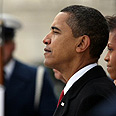
Obama. Commited to Israel's defense
Photo: AFP
WASHINGTON – "US President Barack Obama will make progress on the Israeli-Palestinian conflict a key diplomatic priority from day one," a White House foreign policy statement released Wednesday says.
The clause says Obama and his vice president, Joe Biden, "will make a sustained push – working with Israelis and Palestinians – to achieve the goal of two states, a Jewish state in Israel and a Palestinian state, living side by side in peace and security."
The Israeli-Palestinian conflict is one of five clauses listed under the heading, "Renewing American diplomacy".
Op-Ed
Yitzhak Benhorin
As he enters White House, new president faces slew of economic, political challenges
The clause dealing with Israel states that Obama will act to ensure a strong partnership between his country and Israel, that the US will continue to support the State's right to defend itself, and that foreign assistance to Israel will continue.
"Our first and incontrovertible commitment in the Middle East must be to the security of Israel, America's strongest ally in the region," the statement says. It also mentions the Second Lebanon War, stating that Obama had supported Israel's right to defend itself from Hizbullah's weapons.
Regarding foreign aid, the statement says Obama and Biden "defend and support the annual foreign aid package that involves both military and economic assistance to Israel" and call for "continuing US cooperation with Israel in the development of missile defense systems."
'Tough diplomacy with Iran'
The clause on Iran states that Obama "supports tough and direct diplomacy with Iran without preconditions. Now is the time to use the power of American diplomacy to pressure Iran to stop their illicit nuclear program, support for terrorism, and threats toward Israel."
The statement adds that Iran will be given a choice by the new US administration. "If Iran abandons its nuclear program and support for terrorism, we will offer incentives like membership in the World Trade Organization, economic investments, and a move toward normal diplomatic relations. If Iran continues its troubling behavior, we will step up our economic pressure and political isolation," it says.
"Seeking this kind of comprehensive settlement with Iran is our best way to make progress," the statement explains.
During his first day in office Obama called a number of Middle East leaders, including Prime Minister Ehud Olmert and Palestinian President Mahmoud Abbas. Olmert said Israel had been moved by the president's inauguration speech, and briefed him on the situation in Gaza.















